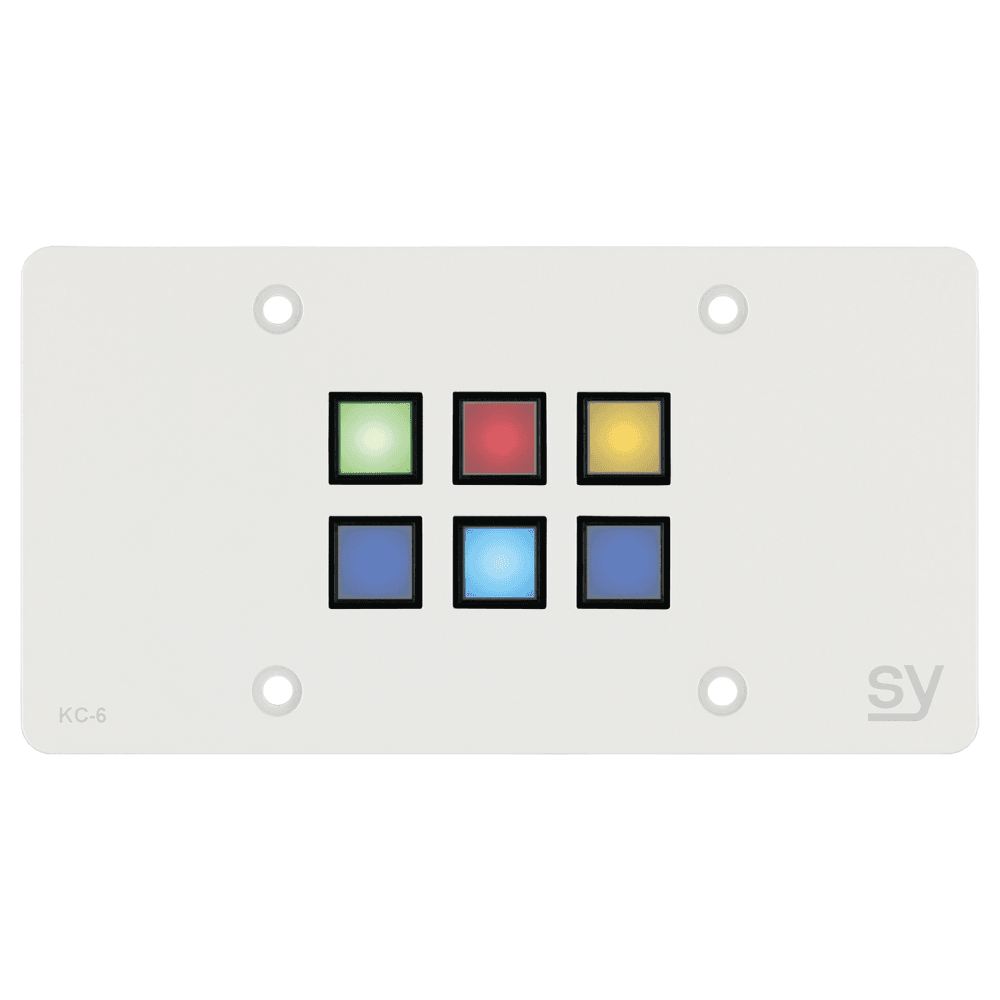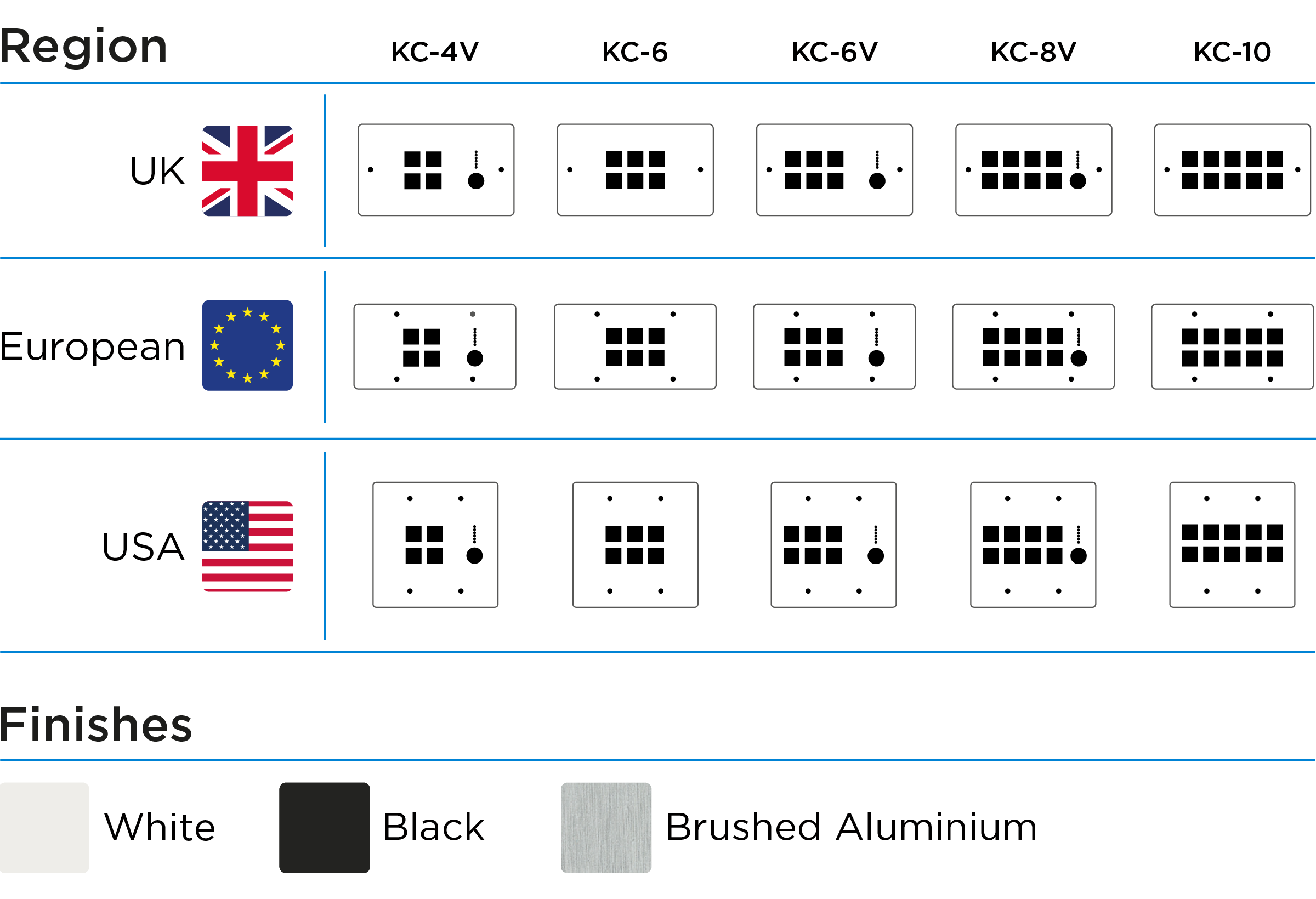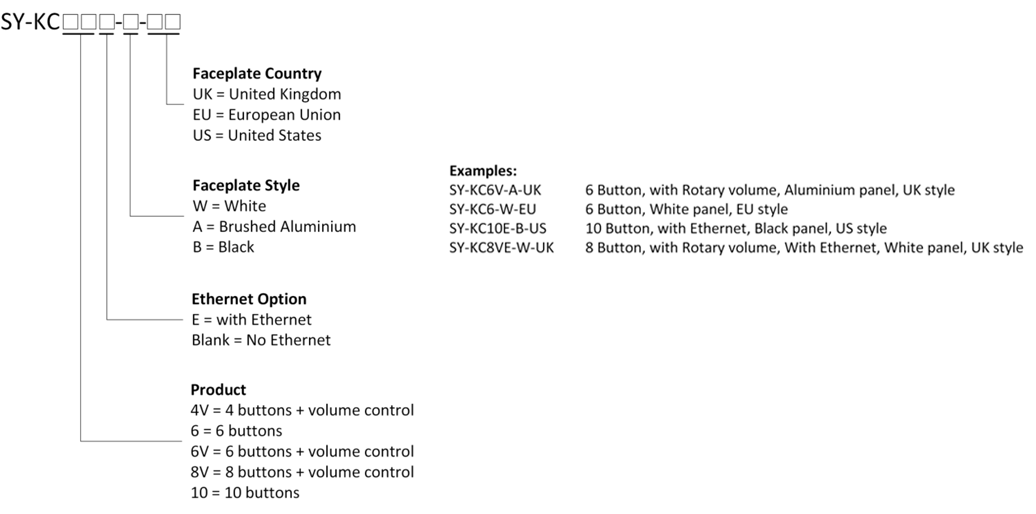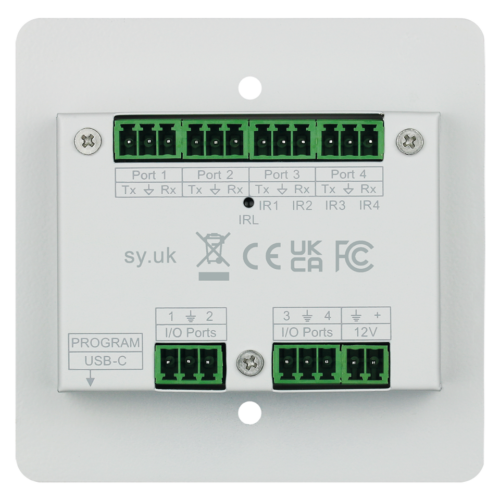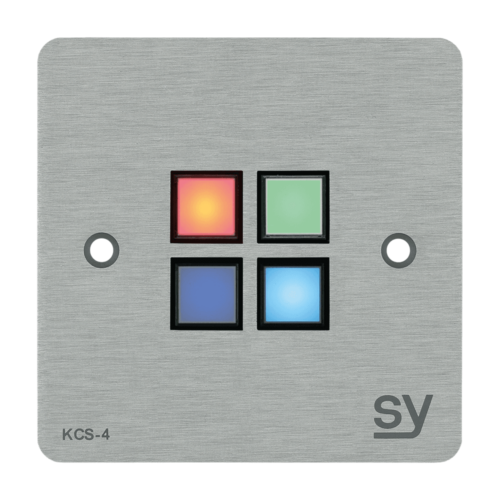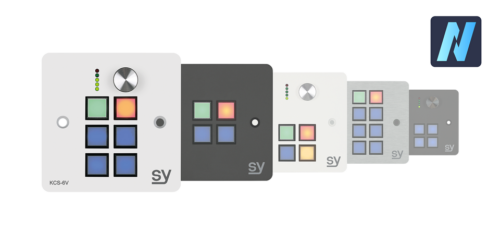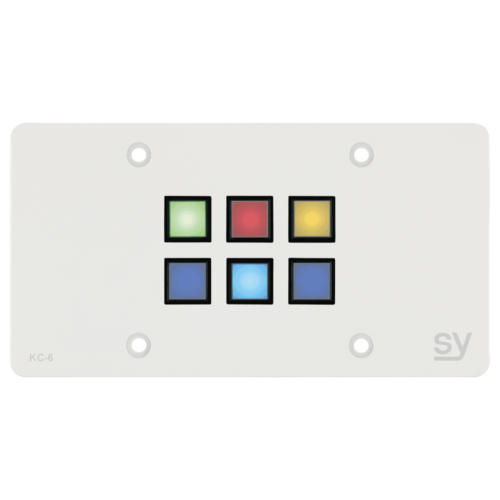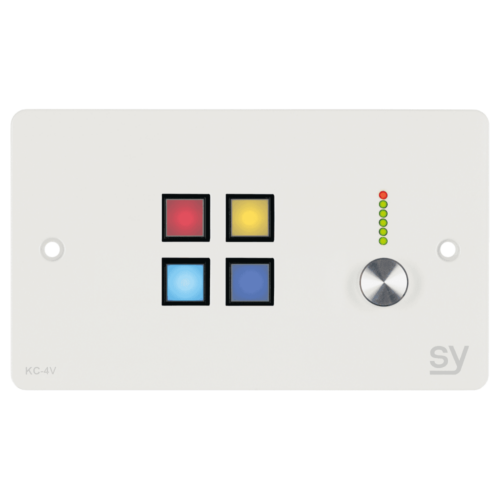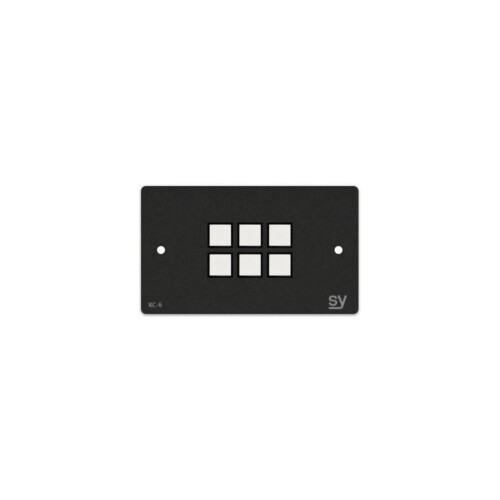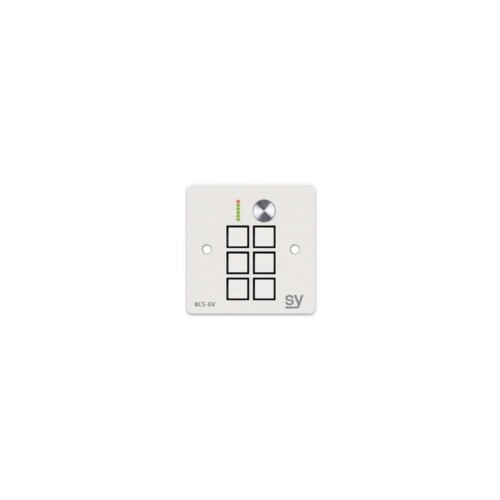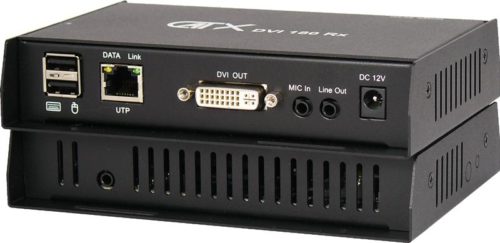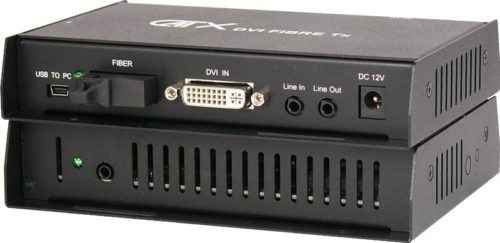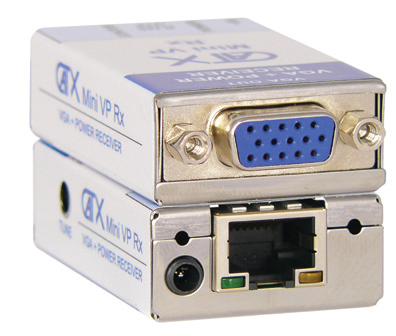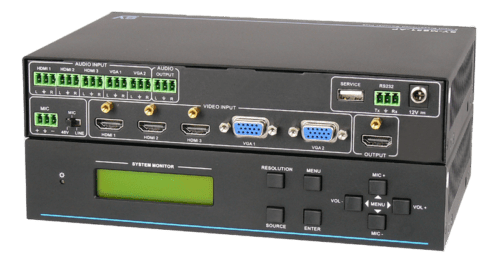SY-KC6E-W-UK is a 6 button Keypad Controller with Ethernet. Tri-colour LEDS, 4x bi-directional RS232, 1x bi-directional RS232/1x RS485/2x IR ports, 1x bi-directional RS232/4x IR ports IR ports, 4x Configurable GPIO ports, 2-gang faceplate in White. Up to 32 concurrent event timers, NebulaStudio® platform –with pre-configured ‘no-code’ or LUA scripting and it is programmable via USB-C or via LAN connection (RJ45).
SY-KC4V-W-UK
The KC range of Keypad Controllers have been designed specifically for complex projects that involve multiple end-point devices, conditional feedback, and automation of sequential and asynchronous tasks. All you need is in the box: simply connect, configure, and within minutes deploy custom autonomous solutions for any centralised AV project.
For distributed projects involving interdependent control centres, a collection of cooperating KC keypad controllers can be deployed over a flexible topology we call the “SY Mesh”. This is an advanced networking capability built into the KC range that allows for the seamless integration of SY controllers and end-point devices without the hassle of complicated network configuration. In combination with SY AV matrices, switches, splitters and extenders, SY keypad controllers are the perfect choice for all the above projects typically found but not limited to education, hospitality, corporate and IT sectors.
Under the hood there are multiple I/O ports as well as support for RS232, IR and RS485 protocols on four dedicated ports, in addition to two Flexi-ports and the option of a PoE LAN port. The customisation of Flexi-ports, general handling of serial commands, I/O manipulation, button colours and other settings are carried out via the NebulaStudio® application. This is a powerful yet intuitive no-code platform allowing for rapid development of the vast majority of projects. For more complex scenarios NebulaStudio® also includes a System Development Kit (SDK) that supports LUA, a lightweight, efficient programming language specifically developed for embedded systems.
Beyond these additional features, we have maintained the slender look and feel of our previous keypad series with clean lines enhancing a minimalist design that naturally blends with its surroundings. As important as aesthetics are, we recognised the challenges and rigours of real-world installation environments, and in line with all our AV products the KC keypads have been engineered to provide robust electrical and mechanical characteristics. To this end, all form factor variants, UK, EU and USA are made with an all-metal chassis and aluminium faceplate, and are finished in black, white, or brushed aluminium.
KC keypad controllers are available with a choice of 4, 6, 8, or 10 RGB illuminated buttons. There are also rotary dial variants as well as an optional ethernet module, allowing for easier adjustment of parameters and greater interoperability respectively.
Powerful controller – Although the KC keypad controller can be used in smaller projects, given its powerful processor, large memory, 32 concurrent event timers and ethernet option, it is a powerhouse ideal for larger complex projects. More specifically, the range has been designed for complex single room, split room, multi room, or distributed multi-controller applications. Complex automation tasks normally reserved for third party dedicated control systems can now be managed in one place straight from the heart of your AV project.
RGB illuminated buttons – Each button can be set to a specific true colour and intensity level, allowing for harmonisation of button groups displaying subtle or exaggerated changes. Soft transitions permit smooth fades between illuminated states, creating a more sophisticated user experience. All buttons can be labelled using the supplied legend sheet or own custom labels, and protected with clear caps. A Cap Removal Tool (CRT) is included with each KC controller to assist with removing the caps, should it be required to replace a label in the future.
Flexible comm ports – Up to 6x RS232, 1x RS485, and 4x IR emitter ports are available, as well as an optional PoE Ethernet LAN port (supporting 128 devices). Our configurable Flexi-Ports ensure optimal utilisation of resources, selecting a combination of ports that meet the exact requirements of each specific installation.
I/O ports – There are 4x Digital I/O Ports available, each of which can be configured as an input or output port. These ports can interface 24V DC devices and are capable of current sink (pull low) to 200mA. The ports are protected against over current, and back EMF from inductive loads such as relays. The inclusion of input pull-up resistors ensures simple direct interface with external switches or contact closures.
IR learner – For convenience, there is also an inbuilt Universal IR Learner (25-60KHz carrier), which is used for capturing IR codes from any remote-control handset.
NebulaStudio® software – To facilitate rapid development of robust extendable software solutions we have created a number of dedicated applications in a single integrated environment, namely the NebulaStudio®.
At its heart lies an intuitive no-code property-based configuration system ideal for rapid development of most common operations. This is made possible by binding a host of customisable command sequences to specific keypad buttons. These groups of sequential and asynchronous commands together with delays, event timers, colour changes and state transitions realise a specific behaviour which can be customised via a set of properties.
For more advanced tasks a dedicated LUA SDK provides an intelligent editor and an efficient compiler that enable the user to write procedural or object-oriented programs capable of solving the most demanding of requirements.
The SY command library is also an integral part of NebulaStudio®. This is an extensible collection of command sequences necessary for interaction with specific end-point devices.
Finally, the NebulaStudio® includes a native keypad simulator that caters for soft testing of specific configurations as well as LUA scripts.
The SY mesh- This is a radical networking concept logically connecting end-point devices to the mesh network as opposed to a specific controller port. This abstraction allows for incredibly flexible system topologies, greatly enhancing scalability and reliability whilst minimising configuration effort.

